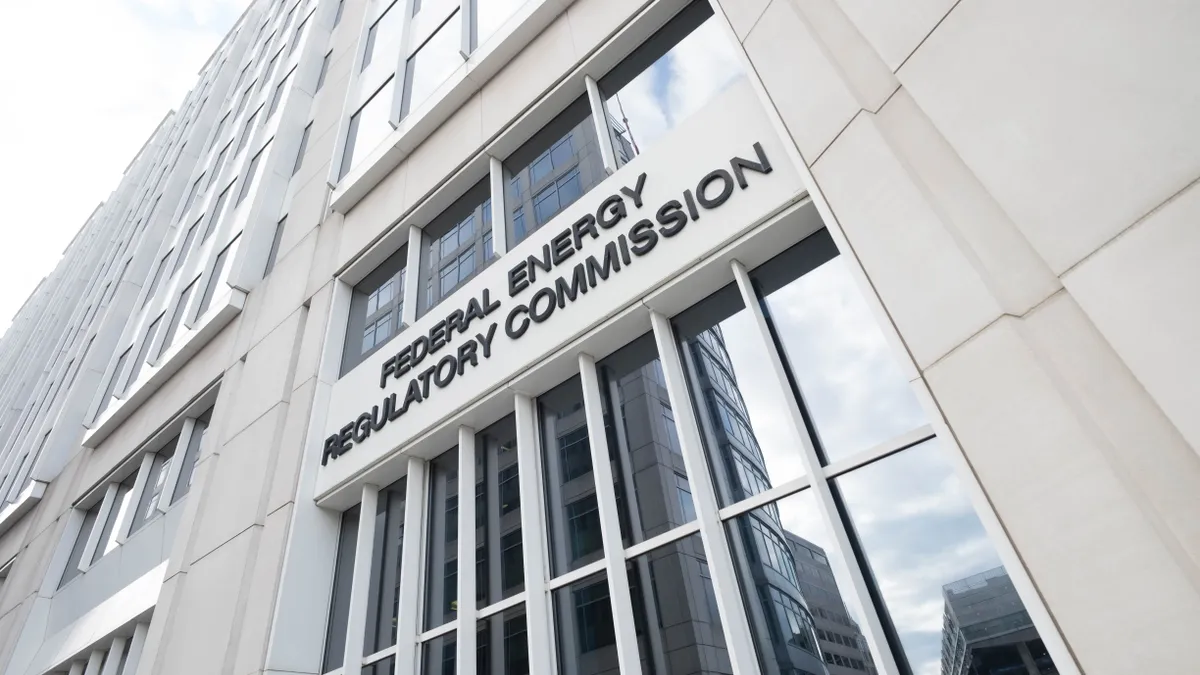Dive Brief:
-
Democrats on the Federal Energy Regulatory Commission won a rare battle Monday when FERC accepted proposed changes to ISO-New England's market rules to transition the region to valuing "fuel secure" resources.
-
ISO-NE proposed to treat resources with uninterruptible fuel supplies as "price takers" in its next three capacity auctions until it can devise market-based payments for the plants. FERC accepted the plan in a 2-1 vote and directed ISO-NE to file permanent market rules by June 2019.
-
Republican Chairman Neil Chatterjee issued a dissent and Commissioner Kevin McIntyre did not vote, allowing Democrat Commissioners Cheryl LaFleur and Richard Glick to approve the ISO-NE proposal with their votes. The Senate is scheduled to vote on the likely confirmation of Republican FERC nominee Bernard McNamee this week.
Dive Insight:
FERC's 2-1 approval of ISO-NE's fuel security proposal illustrates why Senate Republicans are moving quickly to confirm McNamee.
FERC's partisan split currently sits at 2-2 after the resignation of Commissioner Robert Powelson in August, but Commissioner Kevin McIntyre is in poor health and has not voted on a major FERC order since stepping down as chairman in October.
That leaves Democrats with an advantage on the federal board until another GOP regulator is confirmed.
The chairman's office, which controls the FERC agenda, had avoided bringing up any major policy issues during the Powelson vacancy, but the tight schedule of the ISO-NE fuel security proceeding meant action was likely necessary this month to avoid delays in the region's next capacity market auction, scheduled for Feb. 2019.
FERC's Monday order reflects the temporary shift in partisan power.
In filed comments, independent generators had complained that ISO-NE's price taker treatment for fuel secure resources would suppress capacity prices below what they would have been if the resources bid into the market. This, they argued, would undermine investment in new resources.
ISO-NE, on the other hand, argued that not applying the price-taker treatment would cause capacity prices to be too high, attracting new generation investment that is not needed.
Chatterjee sided with the independent generators in his dissent, writing that the case required regulators to choose between "the risk of over-procurement and, on the other hand, the risk of exacerbating the fuel security problem by accelerating resource retirements."
"On balance, I find it more acceptable to risk over-procurement than to risk intensifying the significant fuel security concerns that these tariff revisions are intended to address," he wrote.
The Democrats, however, took ISO-NE's side, writing that it is reasonable for the grid operator to attempt to avoid the construction of unneeded power plants.
"We recognize that it is not possible to avoid an impact on either the pricing in the [capacity market] or the quantity of resources procured to satisfy resource adequacy when finding that a resource must be retained for fuel security," the majority wrote. "We find reasonable ISO-NE's choice to protect against inefficiently over procuring capacity resources by reflecting a fuel security resource's contribution to resource adequacy in the [capacity market]."
Price taker treatment will apply to fuel secure resources in market auctions in 2019, 2020 and 2021, each allocating capacity that must be available three years in the future. It is likely to apply to at least one plant — Exelon's 1,700 MW Mystic Generating Station in Boston that is the subject of a parallel cost recovery petition at FERC.
The ISO-NE fuel security proceeding was initiated when FERC this summer rejected a broader proposal from the grid operator to save two of the units at Mystic from retirement and value fuel security in the market.
Glick dissented on that order, writing that FERC's fuel security criteria was too broad, and dinged it again in a concurrence issued Monday.
"[I]n rushing to bail out the Mystic facility, the Commission prematurely cut off a debate that might have led to more durable solution to New England's fuel security concerns," Glick wrote. "Nevertheless, there can be more than one just and reasonable rate, meaning that my belief that the existing tariff is just and reasonable does not preclude me from finding that the proposed replacement tariff is itself just and reasonable."
Glick's concurrence also included a warning for other grid operators seeking to value fuel security, such as the PJM Interconnection, which issued a high-profile fuel security report last month.
"New England's potential fuel security issues do not appear to be present in any other region, especially with regard to its reliance on natural gas, limited options for fuel delivery, and the consequences of load shedding in its particularly cold winters," he wrote. "Accordingly, the fact that an interim measure of this sort is just and reasonable in New England does not necessarily indicate that even the exact same proposal would be just and reasonable in other regions of the country."
The Democrats' advantage at FERC could end as soon as this week. Senate Majority Leader Mitch McConnell on Monday scheduled a full vote on McNamee for Wednesday afternoon, and the Republican-led Senate is likely to confirm him despite the release of a video that shows the nominee criticizing renewable energy and environmental groups that do business before FERC.














